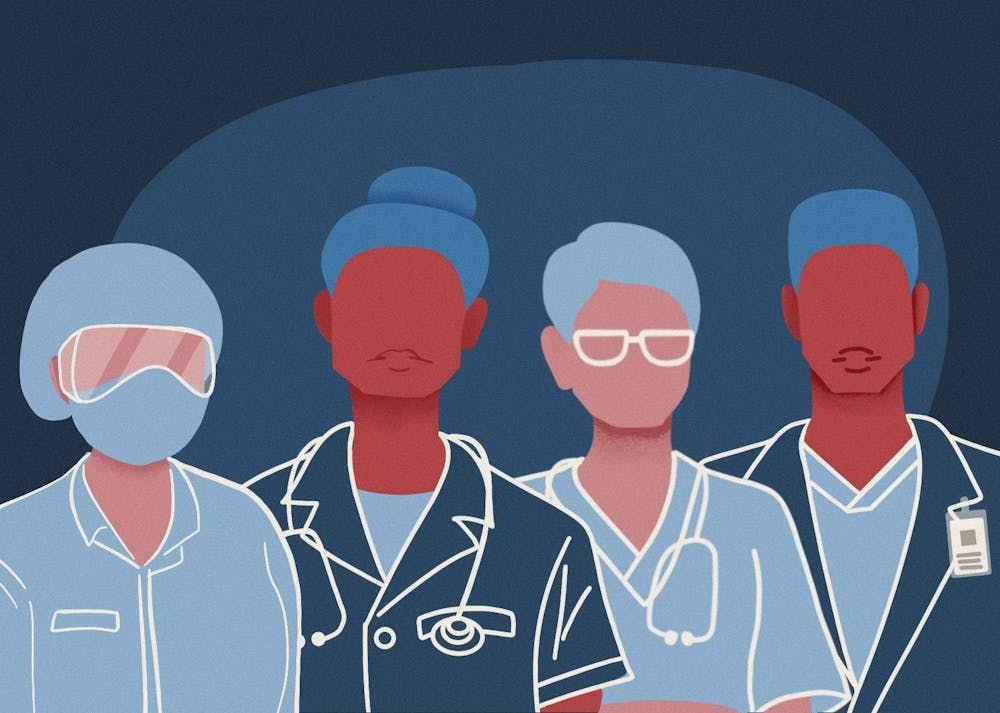Nursing students at ASU have to pay large amounts of money on out-of-pocket expenses for equipment and travel required for the major. This limits access to the program and hinders students’ ability to go into a field that is in high demand.
Edson College of Nursing and Health Innovation associate dean Katherine Kenny and senior director for recruitment and student success Nancy Kiernan said in an email that ASU nursing students are required to pay for scrubs, stethoscopes and specialized shoes.
An officially licensed location to purchase this equipment is Apparel Pro. Nursing students said they are required to use ASU-branded nursing gear, and Apparel Pro is one of the more common locations students use to purchase this equipment.
According to the Apparel Pro website, the ASU dress code reads, “Students are required to purchase all uniform items with the ASU CONHI insignia through the approved vendor. These items include: wine scrub jacket, wine scrub shirt, white polo shirt.”
Alison Berg, a sophomore nursing student at ASU, said the added expenses create a “stressful environment.”
“I feel like it should be provided, in a way, because we’re trying to do our clinicals and work and everything like that just to get our education,” Berg said.
There are also other expenses, such as Castlebranch registration ($163), NCLEX test registration fee ($200), ATI testing (ranging from $400-600), textbooks, a drug and alcohol screening ($80), a criminal background clearance ($74), My Clinical Exchange fees ($40) and other ASU fees.
ATI testing, a nursing learning tool, costs an estimated $400 per semester for traditional nursing students but can cost upwards of $600. Stethoscopes, uniforms, shoes and skills bags cost an estimated $600 to $800.
On top of those necessities, nursing students also have to find a way to go to and from the hospitals they are assigned to for clinicals which are hands-on hospital work required for graduation.
READ MORE: Nursing students face challenges to find transportation to required clinical experiences
“A lot of people do struggle with transportation, because it’s all just on your own,” said Kyle Beer, a sophomore studying nursing.
Nursing students fill out a form before clinicals start to name location preferences, but Beer said students can still be placed far from their preferences.
All of these obstacles create boundaries to accessibility for before and during the program.
College is already expensive as is, so when the program adds additional expenses for equipment needed to be in the major, students are less inclined to study nursing.
“Nursing education is highly sought after, which leads to a very competitive application process,” said Hadaad Dine, a sophomore nursing student in the accelerated program. “So, if somebody is worried about financial aid… they might just completely decide not to go into that field.”
There are things that nursing students said ASU could do to make the nursing program more accessible.
Outside of having the various expenses paid for, they suggested implementing a program where nursing students could donate equipment that could then be rented out to other students at a cheaper price.
“I feel like they could have a hand-me-down program,” Berg said.
The accelerated program also provides a reimbursement for transportation and required equipment for students, but the regular nursing program does not.
“We need to pay now, to purchase the items ahead of time, but once they verify financial aid, they’ll give us a reimbursement of those scrubs, textbooks and all the stuff,” Dine said.
Given that there’s a shortage of nurses in the U.S. following COVID-19 burnout, it’s wrong that so many obstacles are placed in the way of becoming a nurse.
“In a time where everybody’s saying there’s a nursing shortage and we need more nurses, and even the nursing program itself wants to get as many people as they can, you’re making it a little tough for a lot of people to do that,” Beer said.
The statement provided by Kenny and Kiernan said, "Students are encouraged to file a FAFSA and work with ASU Financial Aid and Scholarship Services regarding financial aid."
ASU should cover the added expenses that nursing students need to pay, and it should introduce measures to make the nursing school more affordable until all expenses can be covered.
Edited by Kate Duffy, Jasmine Kabiri and Anusha Natarajan.
Reach the columnist at astigile@asu.edu and follow @StigileAaron on Twitter.
Editor's note: The opinions presented in this column are the author's and do not imply any endorsement from The State Press or its editors.
Want to join the conversation? Send an email to opiniondesk.statepress@gmail.com. Keep letters under 500 words and be sure to include your university affiliation. Anonymity will not be granted.
Like The State Press on Facebook and follow @statepress on Twitter.

Aaron Stigile is an opinion columnist at The State Press. He previously wrote for The Defiant Movement and is working toward a bachelor’s degree in Journalism and Mass Communication. He is also working toward a minor in Spanish and a certificate in Cross-Sector Leadership.




